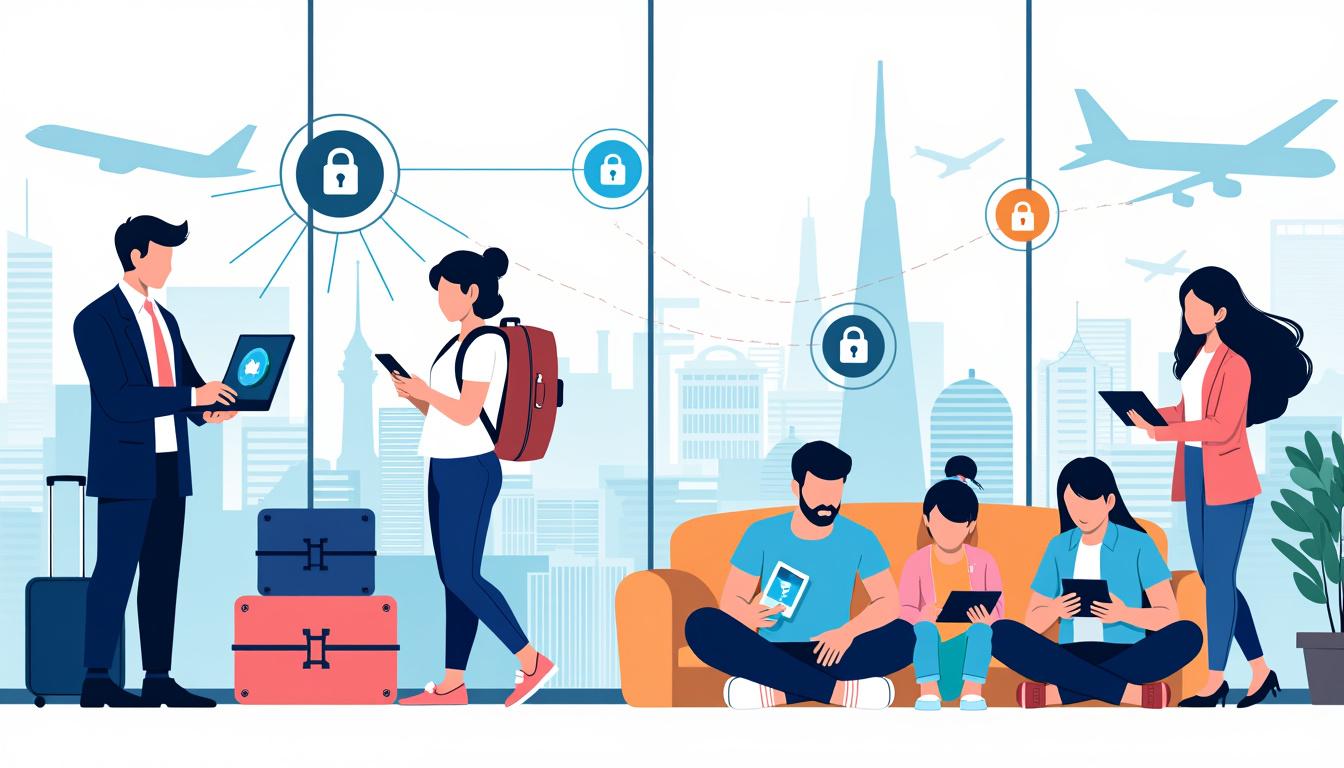Traveling in an increasingly digital world demands a strategic approach to cybersecurity. Travelers face amplified risks as they often connect to public Wi-Fi networks, use unfamiliar devices, and store sensitive information on laptops and smartphones. The integrity of personal data can be compromised swiftly without the right precautions, making it essential to implement robust cybersecurity measures before and during travel. Understanding threats like data interception, malware infections, and identity theft is vital for any explorer aiming to protect their devices and privacy on the go.
Key Cybersecurity Best Practices for Travelers to Protect Devices and Data
Devices become vulnerable when connected to easy-to-access networks or when security software is outdated. Ensuring strong protection starts with adopting preventive habits and tools that resist common cyber attacks during travel.
- Utilize reputable security software: Solutions from Norton, McAfee, Kaspersky, Bitdefender, Panda Security, Trend Micro, AVG Technologies, Avira, and Symantec offer real-time protection and malware detection that are critical when accessing public Wi-Fi abroad.
- Keep software and devices updated: Regular updates patch security flaws—often exploited by hackers—making timely updates indispensable.
- Avoid public Wi-Fi for sensitive transactions: Public networks frequently lack encryption, exposing data to interception. Use a Virtual Private Network (VPN) such as CyberGhost to encrypt data traffic and hide online activities.
- Enable multi-factor authentication (MFA): Adding a second verification step greatly reduces unauthorized access risks to accounts and devices.
- Turn off automatic connections: Disable Wi-Fi and Bluetooth auto-connect features to prevent devices from connecting unknowingly to malicious networks or devices.
| Cybersecurity Measure | Purpose | Recommended Provider or Tool |
|---|---|---|
| Real-time Protection | Prevent malware and virus infections | Norton, McAfee, Kaspersky |
| VPN Usage | Encrypt internet traffic on public networks | CyberGhost |
| Multi-factor Authentication | Enhance login security | Built-in device/account settings |
| Software Updates | Patch security vulnerabilities | Automatic updates from OS/software |
Understanding Public Wi-Fi Risks and How to Safeguard Your Connections Abroad
Public Wi-Fi remains one of the most tempting yet dangerous assets for travelers. Cybercriminals exploit weak networks to implement man-in-the-middle attacks, eavesdrop on communication, and steal credentials. Safeguarding against these threats requires awareness and technical countermeasures.
- Verify the network: Always confirm the official Wi-Fi network name with staff before connecting to avoid fake hotspots designed to lure unsuspecting users.
- Use VPN services: VPN encryptors like CyberGhost shield your data, preventing hackers from sniffing sensitive packets on public networks.
- Disable sharing options: File sharing and network discovery features should be turned off on devices to avoid exposure to other users.
- Prefer mobile data where possible: Using cellular networks limits exposure to unsecured Wi-Fi dangers.
- Utilize firewall and anti-malware protection: Make sure your software solution, such as Bitdefender or Avira, includes an active firewall to monitor suspicious incoming connections.
| Risk | Description | Protection Tip |
|---|---|---|
| Fake Hotspots | Cybercriminals create fake Wi-Fi networks to intercept data | Ask staff for official network names; avoid unverified networks |
| Data Interception | Unencrypted traffic can be read by attackers | Use VPN like CyberGhost to encrypt data transmission |
| Malware Injection | Downloading files or browsing can introduce malicious software | Have updated antivirus software such as Norton or Trend Micro |
Device Protection Essentials: Preparation and Behavior for Travel Security
Actions taken before departure and daily habits while on the move shape the security posture of your digital devices. Proactive steps greatly reduce the chance of theft, loss, or compromise.
- Back up data: Secure a current backup on encrypted external drives or cloud services to mitigate data loss risks.
- Use strong, unique passwords: Password managers recommended by AVG Technologies and Symantec help generate and store complex credentials.
- Physically secure devices: Avoid leaving laptops or smartphones unattended in public places; use locking cables or secure enclosures when possible.
- Activate remote wipe and tracking: Enable features like Find My Device to remotely erase data or locate lost hardware.
- Limit device carrying: Only bring essential devices to reduce exposure and complications in case of theft.
| Preparation Step | Benefit | Tool or Software |
|---|---|---|
| Data Backup | Prevents permanent loss of important files | Encrypted cloud services or external drives |
| Password Management | Enhances password strength and uniqueness | AVG Technologies, Symantec password managers |
| Device Tracking & Remote Wipe | Enables recovery or protection of lost devices | Built-in OS tools like Find My iPhone, Find My Device |
Leveraging Trusted Cybersecurity Brands and Resources During Your Trip
Selecting reliable cybersecurity providers ensures continuous defense while traveling. Modern solutions integrate VPNs, malware detection, and easy-to-manage interfaces, facilitating protection even for non-experts.
- Comprehensive Security Suites: Norton and Bitdefender excel at combining antivirus, firewall, and identity protection under a single dashboard suitable for travelers.
- Lightweight VPN Clients: CyberGhost and Avast VPN services are designed for fast, secure connections on the go.
- Security on Budget: AVG Technologies and Panda Security offer strong protection options with flexible plans ideal for occasional travelers.
- Mobile-Focused Solutions: Trend Micro and Kaspersky provide specialized apps optimizing protection for smartphones and tablets.
- User Support and Updates: Continuous updates and customer assistance help maintain defense depth against evolving cyber threats.
| Brand | Key Features | Best Use Case |
|---|---|---|
| Norton | Comprehensive protection, identity theft monitoring | Travelers who want all-in-one security |
| Bitdefender | Advanced threat defense, low system impact | Users needing resource-friendly security |
| CyberGhost | VPN with easy setup, privacy focus | Secure internet access via public Wi-Fi |
| AVG Technologies | Budget-friendly antivirus and password management | Occasional travelers and light users |
Incorporating cybersecurity vigilance into travel routines empowers explorers to keep their data intact and enjoy digital freedom safely, enriching the journey itself. For more travel safety tips, visit Travel To Adventures’ cybersecurity tips for vacation and discover strategies that safeguard holiday experiences.
To extend practical travel safety knowledge, reading about practical weekend getaway advice can optimize preparation efforts at Travel To Adventures’ weekend adventure tips. For destinations such as Miami, cybersecurity awareness during busy travel periods is crucial; see insights at Travel To Adventures Miami Memorial Day Tips.
Frequently Asked Questions About Cybersecurity While Traveling
- Q: Are VPNs necessary for all travelers?
A: Using a VPN like CyberGhost is highly recommended, especially when connecting to public or unfamiliar Wi-Fi networks, providing a secure encrypted tunnel for data. - Q: What should I do if my device is lost or stolen abroad?
A: Activate remote wipe and tracking immediately via built-in tools such as Find My Device to protect personal data and attempt recovery. - Q: Can free antivirus software suffice for travel protection?
A: Free solutions may offer baseline protection, but comprehensive paid suites from Norton or Bitdefender tend to provide enhanced features critical for traveling environments. - Q: How to recognize a safe public Wi-Fi network?
A: Confirm official network names directly with venue staff and avoid networks with generic or suspicious identifiers. Prefer networks requiring passwords over open connections. - Q: Is it safer to travel without digital devices?
A: While disconnecting reduces cyber risks, it is often impractical. Applying security best practices substantially reduces risks while allowing productive travel experiences.


